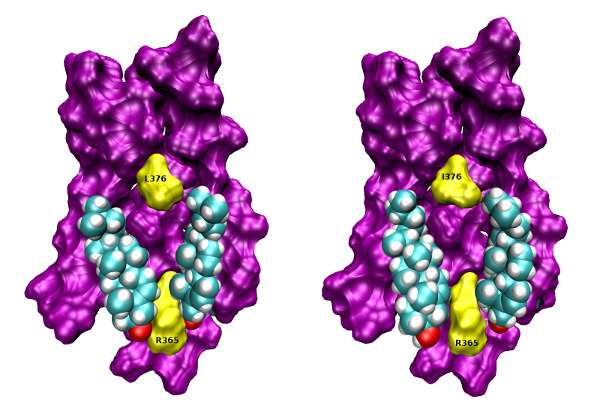Molecular mechanisms of membrane cholesterol effects on function of muscarinic receptors
Cholesterol has been found to co-crystallize with a number of GPCRs. Our current experiments show that membrane cholesterol specifically binds to a muscarinic receptor and slows down their activation.
Muscarinic acetylcholine receptors are G-protein coupled receptors (GPCRs) located in the plasma membrane of many cell types of various tissues. These receptors mediate extracellular to intracellular signalling. Alterations in signalling via muscarinic receptors play an important role in a variety of neurological and psychiatric disorders, e.g. Alzheimer's disease, schizophrenia, and also in other internal diseases, e.g. asthma and overactive bladder.
Cholesterol has been found to co-crystallize with a number of GPCRs. Our current experiments show that membrane cholesterol specifically binds to a muscarinic receptor and slows down their activation. The aim of the project is, by using advanced fluorescent methods, to delineate the molecular mechanisms of cholesterol action at muscarinic receptors and to identify putative differences among subtypes of muscarinic receptors.

Cholesterol binding to the intracellular half of TM6 of wt (left) and L376I mutant (right) M1 receptor based on crystal structure 5CXV (Thal et al., 2016) is shown. Orientation, extracellular side up, TM6 front. Colours: magenta, surface of TM5, TM6 and TM7, yellow, surface of R365, L376 and I376; cyan, carbon; white, hydrogen; red, oxygen.
Relavant publications:
G. Gimpl, Interaction of G protein coupled receptors and cholesterol, Chem Phys Lipids. 199 (2016) 61–73.
P. Michal, E.E. El-Fakahany, V. Doležal, Changes in Membrane Cholesterol Differentially Influence Preferential and Non-preferential Signaling of the M1 and M3 Muscarinic Acetylcholine Receptors, Neurochem Res. 40 (2014) 2068–2077.
M. Manna, M. Niemelä, J. Tynkkynen, M. Javanainen, W. Kulig, D.J. Müller, T. Rog, I. Vattulainen, Mechanism of allosteric regulation of β2-adrenergic receptor by cholesterol, Elife. 5 (2016) 1–21.
A. Randáková, E Dolejší, V. Rudajev, P. Zimčík, V. Doležal, E.E. El-Fakahany, J. Jakubík, Role of membrane cholesterol in differential sensitivity of muscarinic receptor subtypes to persistently bound xanomeline . Neuropharmacology 133 (2018) 129-144.
